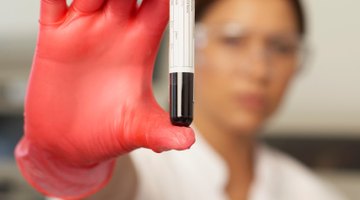hCG Levels After a Miscarriage
Human chorionic gonadotropin, or hCG, is a hormone made by the placenta to help support the growth of the fetus during pregnancy.
During normal pregnancy, hCG levels generally double about every 48 to 72 hours and can be detected by a blood test about 3 weeks from the last menstrual period. If a pregnancy ends in a miscarriage, defined as a pregnancy loss before the 20th week, hCG levels should return to their pre-pregnancy level, which typically is undetectable.
hCG Levels
According to "Teitz Textbook of Clinical Chemistry," the normal value for hCG in the blood of a non-pregnant female is less than 5 milli-international units per milliliter, or mIU/mL. During pregnancy, the concentration of hCG typically rises to 25 mIU/mL by the first day of a missed menstrual period, or about 4 weeks from a woman's last menstrual period.
By 8 to 10 weeks into a pregnancy, the concentration of hCG in the blood typically peaks at about 100,000 mIU/mL. After this, the concentration of hCG declines somewhat throughout the second trimester and then levels off around week 20 until the birth of the baby and the delivery of the placenta. When a miscarriage occurs, the level of hCG in the blood typically begins to fall and may be monitored by a physician until it returns to non-pregnant levels.
hCG After Miscarriage

What Causes HCG Levels to Fluctuate?
Learn More
The week of the pregnancy during which a miscarriage occurs and the corresponding level of hCG in the blood at that time will determine how long it takes hCG levels to return to pre-pregnancy levels.
A miscarriage at 8 to 10 weeks, at the highest concentration of hCG, will generally take the longest to return to normal compared to miscarriage at other times. How the miscarriage occurred, such as spontaneous miscarriage or medical procedure, can also affect how fast hCG levels decrease. In general, hCG levels return to normal by 4 to 6 weeks after a miscarriage, but they may occur sooner during the very early stages of pregnancy.
Placental Causes of High hCG
After a miscarriage, hCG levels can sometimes remain elevated.
This may occur because not all pregnancy-related tissue was passed during the miscarriage.
Other causes include pregnancies that do not develop normally, such as a blighted ovum, when the placenta develops but a fetus does not; an ectopic pregnancy, where a fertilized egg implants outside the uterus; or other abnormal developmental problems.
As long as placental tissue is still present and can produce hCG, the blood level will not return to normal. Such remaining pregnancy-related tissue may have to be removed surgically, using a surgical procedure known as a D&C, or dilation and curettage.
When Tumors Cause High hCG

Causes of High Hormone Levels During Pregnancy
Learn More
Levels of hCG can also remain high or even increase after an apparent miscarriage in a group of diseases known as gestational trophoblastic disease. This disease involves an abnormal growth in a women’s uterus that can range from a benign tumor to a malignant cancer such as choriocarcinoma. These tumors develop from cells that would normally form the placenta when a woman becomes pregnant.
Levels of hCG are typically higher than in a normal pregnancy of the same duration and will not drop as expected after an uncomplicated miscarriage. The failure of hCG levels to return to normal after a miscarriage should prompt further evaluation and diagnostic testing.
Related Articles
- Tietz Textbook of Clinical Chemistry and Molecular Diagnostics: Carl Burtis, et al.
- Robbins Pathological basis of Disease: Ramzi Cotran, et al.
- Clinical Chemistry: Theory, Analysis, Correlation; Lawrence Kaplan, et al.











